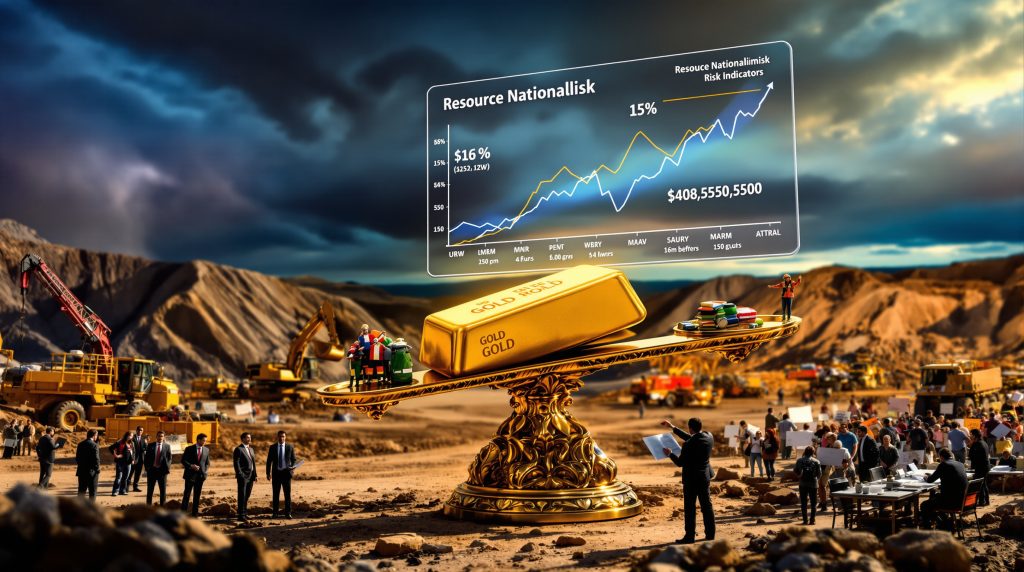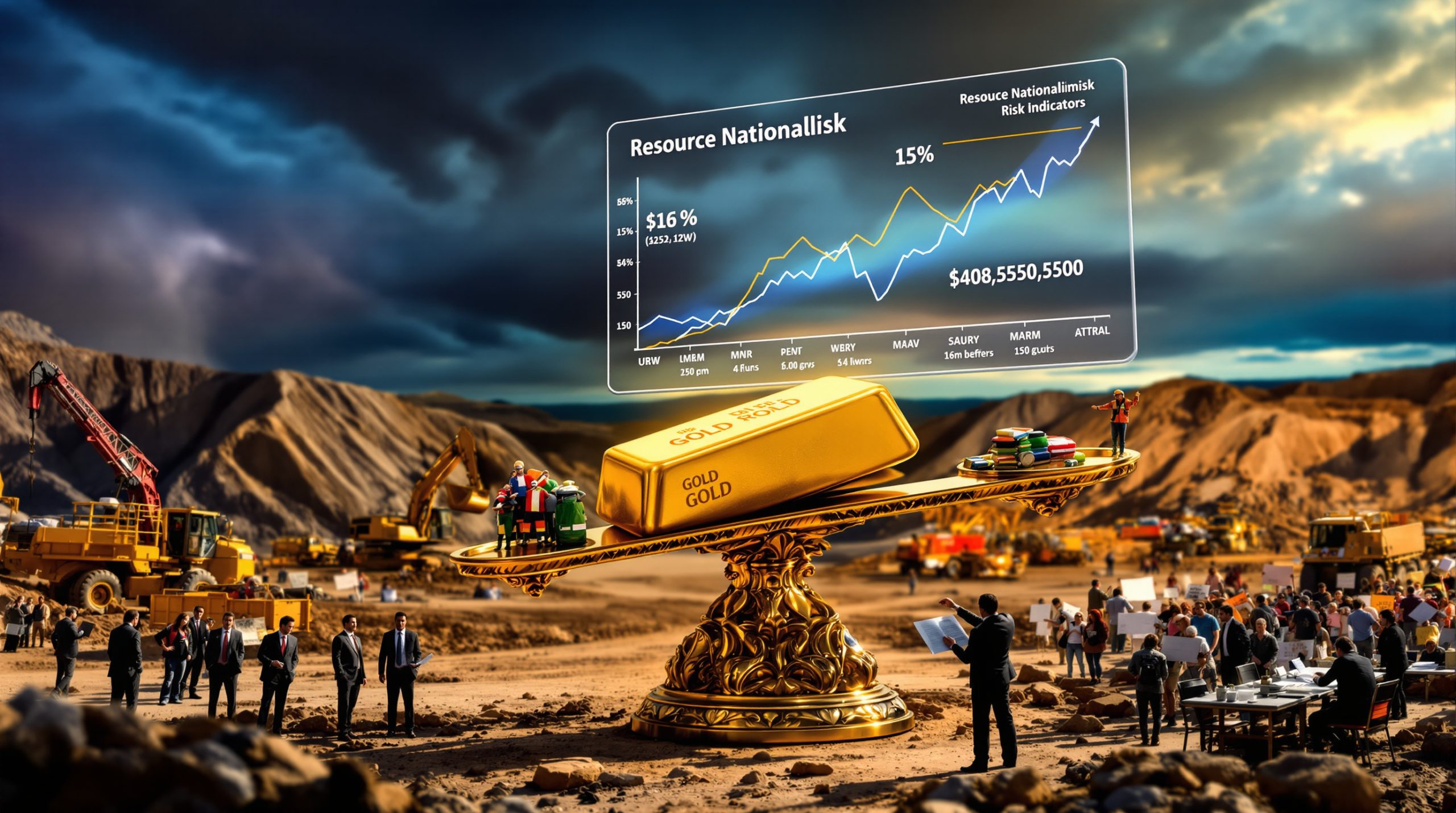Understanding Political Risk in the Mining Industry: A Comprehensive Guide
Political risk in the mining sector encompasses the potential threats to operations and investments stemming from political decisions, governmental actions, and socio-political instability. Unlike typical business risks, political risks can emerge suddenly and have devastating consequences for mining projects regardless of their technical or economic viability.
The mining industry faces unique vulnerability to political risk due to several factors:
- Long project lifecycles spanning multiple political administrations
- Immovable assets that cannot be relocated if conditions deteriorate
- Strategic importance of mineral resources to national interests
- High capital investments requiring decades for return
- Operations often in regions with volatile political environments
Key Components of Political Risk Assessment
Political risk analysis for mining companies involves evaluating:
- Regulatory stability: How frequently do mining laws and regulations change?
- Resource nationalism trends: Is there growing sentiment for state control?
- Historical precedent: How has the government treated foreign investors previously?
- Political transition mechanisms: Are power transfers peaceful and predictable?
- Stakeholder alignment: Do local communities, regional authorities, and national governments share consistent views?
How Does Resource Nationalism Impact Mining Operations?
Resource nationalism represents one of the most significant political risks facing mining companies today. This phenomenon occurs when governments assert greater control over natural resources through various mechanisms designed to capture more economic value for the state.
Forms of Resource Nationalism
Resource nationalism manifests in multiple ways, each presenting different levels of risk to mining operations:
- Outright expropriation: Government seizure of mining assets without adequate compensation
- Forced renegotiation: Compelling companies to accept less favorable terms mid-project
- Windfall profit taxes: Special taxes triggered when commodity prices exceed certain thresholds
- Increased royalty rates: Higher payment requirements on production volumes
- Local ownership requirements: Mandated minimum percentages of domestic shareholders
- Export restrictions: Limits on mineral exports to encourage domestic processing
Recent Examples of Resource Nationalism
The mining industry has witnessed numerous instances of resource nationalism globally in recent years:
- In Mali, the government confiscated approximately $300 million worth of gold from major mining operations after disputes over mining code changes
- Several Latin American countries have implemented higher royalty structures specifically targeting mining companies during periods of high commodity prices
- Indonesia implemented export bans on unprocessed minerals to force companies to build domestic processing facilities
- Multiple African nations have introduced mandatory minimum local ownership requirements for mining projects
The Gold Price Factor
Higher commodity prices often correlate with increased resource nationalism pressures. Industry analysis indicates that when gold reaches elevated price levels (such as $3,800 per ounce), governments become increasingly motivated to capture a larger share of mining profits, particularly in countries facing economic challenges.
This pattern creates a paradoxical risk where mining company success during bull markets can trigger governmental actions that threaten that very success. Mining executives must therefore be particularly vigilant about resource nationalism risks during periods of strong commodity price performance.
What Regional Political Risks Affect Mining Companies?
Political risk profiles vary significantly by region, with distinct patterns emerging across different mining jurisdictions that companies must navigate:
Africa
- West Africa: Countries like Mali and Burkina Faso have experienced military coups affecting mining agreements, with some companies facing asset confiscation
- Central Africa: Artisanal mining conflicts and militia activity threaten formal mining operations and supply chain security
- Southern Africa: Labor disputes and community conflicts frequently disrupt mining activities, leading to production losses
Latin America
- Andean Region: Constitutional reforms in Chile, Peru, and Ecuador have created uncertainty around mining rights and royalty structures
- Brazil: Environmental regulatory shifts following dam failures have increased compliance requirements and operational costs
- Mexico: Policy changes regarding mining concessions have created investment uncertainty and threatened existing operations
Asia-Pacific
- Indonesia: Frequent policy changes regarding export requirements and domestic processing mandates have disrupted mining operations
- Philippines: Provincial-level mining bans conflicting with national policies create regulatory confusion
- Papua New Guinea: Community disputes over resource sharing and environmental impacts frequently halt operations
North America
- Canada: First Nations consent requirements create project uncertainties and timeline extensions
- United States: Permitting timelines extending due to regulatory complexity and environmental review processes, with Trump's minerals order potentially reshaping the landscape
- Mexico: Nationalistic policies affecting foreign mining investments and historical mining rights
How Do Political Transitions Affect Mining Investments?
Election cycles and political transitions represent critical inflection points for mining risk assessment, often creating significant volatility in operating environments:
Pre-Election Period
During election campaigns, mining projects often face:
- Policy uncertainty: Candidates may propose contradictory approaches to mining regulation, creating planning challenges
- Project delays: Permitting decisions frequently stall during election periods as officials avoid controversial approvals
- Investment hesitation: Companies may pause capital expenditures until political direction clarifies, delaying development
Post-Election Implementation
After elections, mining companies must navigate:
- Policy implementation gaps: Differences between campaign promises and actual policies create compliance challenges
- Administrative changes: New officials may interpret existing regulations differently, affecting ongoing operations
- Relationship rebuilding: Establishing connections with new decision-makers requires time and diplomatic resources
Case Study: Election Impacts
The mining industry has witnessed numerous examples where elections dramatically shifted the operating environment:
- In one South American country, a newly elected administration implemented a mining moratorium that halted all new project approvals for 18 months
- Following leadership changes in an African nation, previously approved mining permits were subjected to "review" processes that effectively suspended operations
- A change in provincial leadership in a Canadian province resulted in significantly different interpretations of indigenous consultation requirements, delaying projects
The US‑China trade war has further complicated political risk calculations for mining companies operating in either country or supplying minerals to manufacturers caught in the crossfire.
What Social and Community Factors Create Political Risk?
The social dimensions of mining operations increasingly translate into political risks as communities exercise growing influence over project approvals and continuity:
Community Opposition Mechanisms
Local communities can create political risks through:
- Direct action: Blockades and protests disrupting mine access and operations
- Legal challenges: Using courts to contest permits and approvals, creating costly delays
- Political mobilization: Electing representatives opposed to mining projects who then influence regulations
- International advocacy: Partnering with global NGOs to pressure companies and their investors
The Social License to Operate
Mining companies now recognize that formal permits alone are insufficient without a "social license to operate" – community acceptance that must be continuously maintained:
- Benefit-sharing arrangements: Communities expect tangible economic benefits beyond basic employment
- Environmental performance: Local tolerance for impacts has diminished, requiring higher standards
- Consultation expectations: Communities demand meaningful participation in decisions affecting their land
- Legacy concerns: Historical mining practices affect current company reception, even for new entrants
The Political Dimension of Social Risk
Social conflicts frequently transform into political risks when:
- Local officials adopt community positions to maintain electoral support, changing regulatory enforcement
- National politicians leverage mining conflicts for broader political agendas, affecting policy
- Regulatory agencies respond to public pressure with enhanced enforcement actions
- Courts interpret regulations more strictly in response to community concerns, setting precedents
How Does Environmental Regulation Create Political Risk?
Environmental regulations represent a growing source of political risk for mining companies as standards evolve and enforcement intensifies:
Regulatory Uncertainty
Mining projects face challenges from:
- Evolving standards: Environmental requirements that change during project lifespans, affecting economics
- Retroactive application: New standards applied to existing operations, requiring costly adaptations
- Jurisdictional conflicts: Different government agencies with overlapping authority creating compliance confusion
- Permitting complexity: Multiple approvals with sequential dependencies extending development timelines
Climate Policy Impacts
Climate change policies increasingly affect mining operations through:
- Carbon pricing: Direct costs on emissions-intensive activities affecting profitability
- Energy transition: Changing demand patterns for different minerals creating market uncertainty
- Water restrictions: Competing priorities during scarcity periods limiting operational capacity
- Adaptation requirements: Mandated infrastructure changes for climate resilience increasing capital costs
Environmental Activism and Political Pressure
Environmental advocacy creates political risk through:
- Litigation strategies: Using courts to challenge permits and approvals, causing delays
- Public campaigns: Mobilizing public opinion against specific projects, affecting social license
- Investor pressure: Influencing financing availability for certain projects through ESG criteria
- Regulatory advocacy: Pushing for stricter standards and enforcement affecting operational costs
Recent examples like the Paladin uranium halt illustrate how environmental and regulatory issues can force companies to suspend operations despite favorable market conditions.
What Global Geopolitical Factors Affect Mining Risk?
Beyond country-specific risks, broader geopolitical factors increasingly impact mining operations as strategic competition intensifies:
Trade Tensions and Supply Chain Nationalism
Mining companies face disruption from:
- Export restrictions: Limitations on mineral shipments during trade disputes affecting sales
- Tariff impacts: Changing economics of mineral processing locations affecting investment decisions
- Critical mineral designations: Strategic government interventions in supply chains creating compliance burdens
- Reshoring initiatives: Pressure to relocate processing closer to end markets affecting global strategies
Sanctions and Secondary Sanctions Risk
International sanctions create complex compliance challenges:
- Direct restrictions: Prohibitions on operations in sanctioned countries limiting access
- Secondary sanctions: Penalties for dealing with sanctioned entities affecting supply chains
- Financial constraints: Banking limitations affecting transactions and financing
- Equipment access: Restrictions on technology transfers affecting operational capabilities
Strategic Competition for Critical Minerals
Great power competition affects mining investments through:
- Government incentives: Subsidies for "friendly" production sources changing market economics
- Investment restrictions: Limitations on foreign ownership in strategic sectors reducing options
- Offtake preferences: Government purchasing programs favoring domestic sources affecting pricing
- Infrastructure investments: Strategic development of mineral transportation routes influencing logistics
According to recent research on managing political risks in mining, companies must develop comprehensive strategies that anticipate both direct and indirect consequences of geopolitical tensions.
How Can Mining Companies Manage Political Risk?
Effective political risk management requires comprehensive strategies integrating multiple approaches:
Risk Assessment Frameworks
Leading mining companies employ sophisticated approaches including:
- Country risk matrices: Standardized evaluation criteria across jurisdictions enabling comparison
- Scenario planning: Developing responses to potential political developments before they occur
- Early warning systems: Monitoring indicators of changing political conditions allowing proactive response
- Stakeholder mapping: Identifying key decision-makers and influencers to focus engagement efforts
Contractual Protections
Companies seek to mitigate risk through:
- Stability agreements: Contractual protections against regulatory changes preserving economics
- International arbitration clauses: Neutral dispute resolution mechanisms avoiding local courts
- Force majeure provisions: Protections against extraordinary events enabling operational flexibility
- Gradual investment staging: Limiting exposure until risks clarify and relationships develop
Political Risk Insurance
Specialized insurance products provide:
- Expropriation coverage: Protection against government seizure preserving investment value
- Currency inconvertibility: Safeguards against inability to repatriate funds maintaining liquidity
- Political violence: Coverage for damage from civil unrest protecting physical assets
- Contract frustration: Protection when governments prevent performance securing revenue streams
Stakeholder Engagement Strategies
Effective engagement can reduce political risks through:
- Multi-level government relations: Building relationships at all governance levels ensuring comprehensive support
- Community development programs: Creating shared value with local populations building social license
- Industry association participation: Collective advocacy for stable regulations amplifying influence
- Transparency initiatives: Building trust through information sharing reducing suspicion
How Does Political Risk Vary Across the Mining Lifecycle?
Political risk manifests differently across project stages, requiring tailored management approaches:
Exploration Phase
Early-stage activities face:
- Access uncertainty: Changing rules for exploration permits affecting program planning
- First impressions: Setting community relationship foundations influencing future reception
- Speculative perceptions: Local misunderstandings about project scope creating unrealistic expectations
Recent changes in Saudi exploration licenses demonstrate how governments are becoming more strategic in how they grant access to mineral resources.
Development Phase
During construction, companies navigate:
- Permitting complexity: Multiple sequential approvals creating timeline uncertainty
- Local content pressures: Expectations for domestic procurement affecting construction costs
- Infrastructure negotiations: Government cost-sharing arrangements affecting project economics
- Employment expectations: Promises versus realistic job creation creating potential disappointment
Operations Phase
Producing mines encounter:
- Tax stability challenges: Pressure for increased government take affecting profitability
- Environmental compliance shifts: Evolving standards and enforcement affecting operational costs
- Labor relations politicization: Government involvement in disputes affecting workforce stability
- Community benefit expectations: Growing demands over project life affecting social license
Issues like VAT refund suspension in Ukraine illustrate how established mining operations can suddenly face financial challenges due to government policy changes.
Closure Phase
End-of-life activities face:
- Remediation standard changes: Evolving requirements for site restoration affecting closure costs
- Long-term liability concerns: Responsibility duration uncertainties affecting financial provisions
- Legacy management: Ongoing community relationships post-production affecting corporate reputation
- Reputation impacts: Effects on company's other operations influencing stakeholder perceptions
What Emerging Political Risks Should Mining Companies Monitor?
The political risk landscape continues to evolve with several emerging trends requiring attention:
Technology-Related Risks
New technologies create novel political challenges:
- Automation impacts: Political resistance to job displacement affecting modernization plans
- Data sovereignty: Requirements to store operational data locally affecting systems architecture
- Cybersecurity mandates: Government requirements for critical infrastructure affecting IT investments
- Remote monitoring restrictions: Limitations on cross-border operational oversight affecting management
ESG-Driven Political Pressures
Environmental, Social, and Governance concerns increasingly manifest as political risks:
- Human rights due diligence: Mandatory assessment requirements affecting supply chain management
- Supply chain transparency: Forced disclosure of sourcing practices creating compliance burdens
- Climate accountability: Legal liability for emissions contributions affecting operational planning
- Biodiversity protection: Expanding no-go areas for mining activities limiting resource access
Resource Transition Politics
The shift toward low-carbon minerals creates new political dynamics:
- Strategic mineral designations: Government interventions in critical mineral markets affecting pricing
- Processing requirements: Pressure to develop domestic refining capacity affecting capital allocation
- Benefit-sharing expectations: Higher community demands for "future-facing" minerals affecting economics
- Accelerated permitting: Political pressure for faster approvals of certain minerals creating inconsistencies
FAQs About Political Risk in Mining
How does commodity price affect political risk in mining?
Higher commodity prices often correlate with increased political risk as governments seek to capture a larger share of perceived windfall profits. When gold reaches elevated prices like $3,800 per ounce or silver reaches $48, resource-rich countries frequently implement new taxes, royalty structures, or ownership requirements.
This pattern creates a paradoxical situation where mining company success during bull markets can trigger governmental actions that threaten that very success. The confiscation of approximately $300 million worth of gold in Mali illustrates how high commodity prices can intensify resource nationalism pressures as governments pursue greater economic benefits from their natural resources.
Which mining jurisdictions are considered lowest political risk?
While political risk assessments change over time, jurisdictions consistently rated as lower risk include:
- Australia
- Canada
- Finland
- Ireland
- Norway
- Sweden
- United States
These countries generally feature stable regulatory frameworks, established rule of law, transparent permitting processes, and predictable tax regimes. However, even these jurisdictions present political risks in different forms, including First Nations consultation requirements in Canada or permitting complexities in the United States.
How can junior mining companies manage political risk with limited resources?
Junior mining companies can implement cost-effective political risk management through:
- Partnering with local companies familiar with the political environment and stakeholder landscape
- Focusing on jurisdictions with established mining codes and histories of respecting agreements
- Engaging with industry associations for collective advocacy on regulatory issues
- Developing strong community relationships from the earliest project stages to build social license
- Considering political risk insurance for specific high-value assets or milestones
Smaller companies often have advantages in community relationships due to their focused presence and ability to make decisions quickly, which can offset their resource limitations.
What role do international investment treaties play in political risk mitigation?
Bilateral Investment Treaties (BITs) and Free Trade Agreements (FTAs) with investment chapters provide important protections including:
- National treatment provisions ensuring equal treatment with domestic companies
- Most-favored-nation clauses extending best treatment offered to any foreign investor
- Fair and equitable treatment standards protecting against arbitrary government actions
- Compensation requirements for direct or indirect expropriation
- Access to international arbitration for dispute resolution
However, the effectiveness of these protections varies significantly based on specific treaty language and host country compliance history. Recent trends show some countries withdrawing from investment treaties or renegotiating terms to preserve regulatory flexibility, potentially reducing their protective value for mining investments.
How do ESG requirements affect political risk for mining companies?
Environmental, Social and Governance (ESG) requirements increasingly intersect with political risk in several ways:
- Heightened regulatory scrutiny based on ESG performance affects permitting timelines
- Community expectations reinforced by government policies create operational constraints
- Investor pressure translates into political advocacy influencing regulatory frameworks
- Supply chain due diligence requirements become mandatory through legislation
- Climate commitments affect operational permissions and expansion opportunities
Mining companies with strong ESG performance often face reduced political risk through enhanced stakeholder relationships and regulatory goodwill. Conversely, poor ESG performance can accelerate political risk as governments respond to stakeholder pressure with stricter oversight and enforcement actions.
Further Exploration
For investors and mining professionals seeking to deepen their understanding of political risk factors in the mining sector, several resources can provide valuable insights:
-
Industry Association Reports: Organizations like the International Council on Mining and Metals (ICMM) regularly publish guidance on political risk management best practices.
-
Specialized Risk Consultancies: Firms focusing on mining-specific political risk assessments can provide customized analysis for particular jurisdictions or projects.
-
Academic Research: Universities with strong mining programs often produce detailed studies on the relationship between political factors and mining investment outcomes.
-
Mining Law Specialists: Law firms with mining expertise can provide insights into how contractual structures and international treaties can mitigate political risk exposure.
-
Multilateral Development Institutions: Organizations like the World Bank publish country risk assessments that include mining-specific political risk factors.
Understanding political risk in the mining industry requires continuous monitoring of global trends and local conditions, as the risk landscape evolves with changing economic, political, and social factors.
Disclaimer: This article contains analysis of political risk factors affecting mining investments. While efforts have been made to ensure accuracy, political conditions can change rapidly, and investors should conduct their own due diligence before making investment decisions based on political risk assessments.
Want to Get Ahead of the Next Major Mineral Discovery?
Discover significant ASX mining announcements the moment they happen with Discovery Alert's proprietary Discovery IQ model, turning complex mineral data into actionable insights for traders and investors. Explore historic discovery returns and position yourself to capitalise on these opportunities before the broader market.




